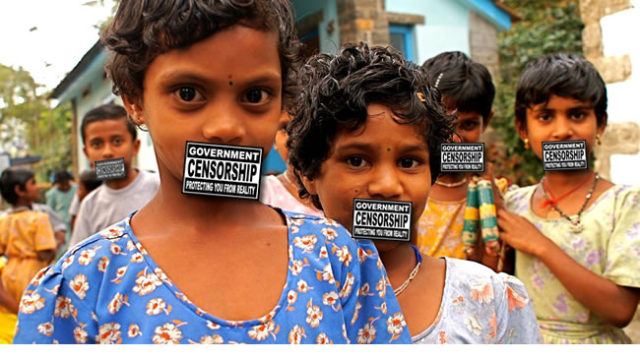Just like the Terms and Conditions of any agreement, the Indian Constitution too has its twists and turns. Though each clause in an Article of the Constitution might seem satisfying in itself, it is incomplete without each and every word of the remaining clauses.
For example, Article 19 where Art.19 (1)(a) states, ‘All citizens shall have the right – to freedom of speech and expression’ , it is countered by Art.19(2) which puts ‘reasonable restrictions’ to the right in the interest of the security of the State, foreign relations, public order, decency or morality, contempt of court, or defamation or incitement to an offence.
Though the right to freedom of speech and expression can through no means be absolute, due to reasons of integrity and sovereignty of the country, the measures taken to curb it are beyond necessary.
So much so, that many sections of the Indian Penal Code do not even abide by the norms set by the International Covenant on Civil and Political Rights (ICCPR) to which India had ratified on 10th April 1976.
The ICCPR recognizes the responsibilities that the freedom of speech and expression carries with it; therefore, it clearly states in its Article 19(3) that the restrictions imposed on the right are necessary only if it concerns to the ‘rights or reputation of others’ and/or for the ‘protection of national security or of public order, or of public health, or of public morals.
Where does the problem lie?
Everything from framing, implementing to the practice of the law is flawed.
The laws are not only vaguely worded, but the Supreme Courts inefficiency in emphasizing precedents has made it vulnerable to being misused and misinterpreted.
These laws can be twisted to an extent, that anyone who seems to cause even the slightest discomfort to a person, court or even the government can be put behind bars with heavy criminal charges.

Read More: Can We Please Ask The Right Questions Against The Flawed Surrogacy Bill, 2016?
To add to it, laws of the colonial period are still held valid. The Sedition law, for example, was introduced to suppress anyone who tried to go against the government. Considering the British rule, this law seemed like a legit move for them to maintain their authority in our country.
But, for a law that states, ‘…attempts to bring into hatred or contempt, or excites or attempts to excite disaffection towards the Government established by law in India shall be punished with imprisonment for life…’ it is surprising that it still holds a strong position in the world’s largest democracy.
The ‘agli tareek’ attitude of the courts makes judicial procedures really long and cumbersome. There have been instances when prosecutions have been dismissed, but have left the accused in a self- censorship state, along with huge bills of the criminal trials.
There isn’t just one law that puts all the restrictions on the freedom of speech, but minor sections of a lot of laws.
Some like the Criminal Defamation Law, Section 66A of the Information and Technology Act, Section 295A and 298 that are against hurting religious sentiments, or the Official Secrets Act, not only successfully curb dissent, but their constitutionality is a matter of debate.
The Solution
The irony of the Indian system is that a right that forms the basis of any democracy, and is constitutionally valid, has to be fought for by the people of the country.
It is not the first time that the laws pertaining to the right have been brought to light, and it is not the first time that the legislature and the judiciary are being blamed for the mishap.
The system is like the proverb, slow and steady wins the race, and needs a regular push towards a change.
Amendments and abolishment of laws that do not satisfy to the ICCPR, need to be made. The laws need to be clear and made aware to the lower offices of the judiciary to avoid abuse.
Most importantly, absurd use of power needs to be curbed before any kind of restriction is put on the freedom of speech and expression.
The freedom of speech and expression is no longer restricted to print media or protests. India is quickly entering the world of digitization, and a restricted right is not going to be of any help in a country where the slightest hitch on social media platforms finds its place on prime time television.
It is important that a recurring limelight is thrown on the structure of the freedom to express so as to help us in getting what is constitutionally ours, with restrictions that are necessary and need to be respected.
Image Credits: Google Images
You May Also Like:
http://edtimes.in/2015/02/al-jazeera-egypt-freedom/































